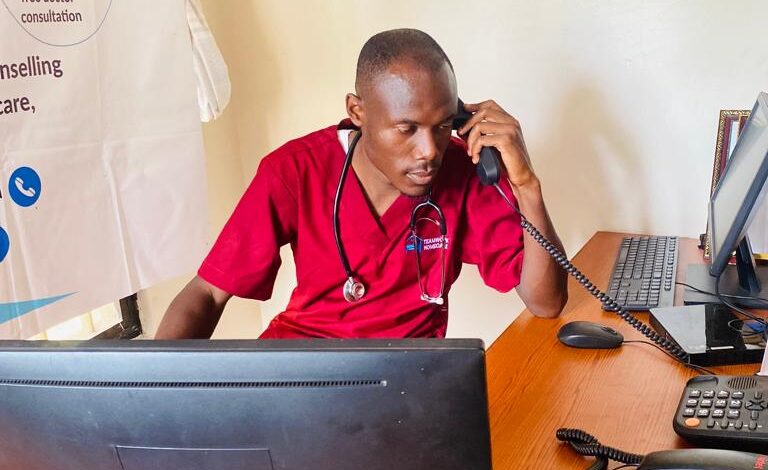Diabetes on the rise, prompt medical attention can save you
Close to 1.7 Million Ugandans are said to be suffering from Diabetes with only 40% having been diagnosed. Prevalence according to research is about 4.4% of Uganda’s population among the productive adult population that is 18-69 years.

By Michael Kanaabi Dollar
Diabetes is quietly nearing pandemic levels with various research outfits indicating prevalence levels globally average about 9.5% to 10.5% of the worlds total population among adults.
In Uganda alone, while prevalence is lower it is growing steadily and so is the cost of managing the disease among those living with it.
Close to 1.7 Million Ugandans are said to be suffering from Diabetes with only 40% having been diagnosed. Prevalence according to research is about 4.4% of Uganda’s population among the productive adult population that is 18-69 years.
Specifically among the men it stands at 4.7% while for the women it is at 4.1% which is slightly lower with the prevalence going up as the age is adjusted upwards standing at 8.5% among those between 60 to 69 years, 6.3% for those between 50 to 59 years and 4.3% for those between 40-49 years. The incidences reported in urban areas are also much higher at 5.5% compared to 3.6% reported in rural areas.
Type 1 Diabetes is the most common in children up to the age of 19 years and still with in the 20-39 year age group although with in this group lifestyle driven type 2 Diabetes is noticed to be on the increase.
As the parameters are shifted to middle age that is 40-64 years and even in advanced age that is 65 years and over, Type 2 Diabetes becomes the most prevalent significantly.
“However health experts observe that with limited access to healthcare and diagnostic facilities these figures may be underestimates especially in rural areas” Medical Professional and CEO Teamwork Homecare Services a provider of home and work place based medical care solutions Julius Habumugisha says.
What is Diabetes and which are the common types?
According to Senior Consultant Dr. Emmanuel Ssekasanvu attached to Teamwork Homecare Services, Diabetes is a group of metabolic disorders which manifest with high blood sugar levels that can lead to a number of complications if left untreated or poorly managed.
“While there are about 6 different types of Diabetes the two most common ones are Type 1 and Type 2 Diabetes.
Type 1 Diabetes is an auto immune condition where the body attacks and destroys insulin producing beta cells in the pancreas. This type of Diabetes accounts for between 5-10% of all diagnosed cases.
Type 2 Diabetes differs from the former and can be defined as a metabolic disorder resulting from insulin resistance and impaired insulin secretion. This type of Diabetes accounts for almost 90% of all cases world wide and in Uganda alone it takes up between 80-90% of all diagnosed cases” Dr. Ssekasanvu says.
Gestational Diabetes is another type of Diabetes and this affects women during pregnancy mainly due to hormonal changes and insulin resistance .
Latent Auto Immune Diabetes in Adults (LADA) is a form of Type 1 Diabetes that develops in adults.
Maturity onset Diabetes for the young (MODY) is a rare genetic form of Diabetes that affects insignificant numbers of the population.
Secondary Diabetes is a type of Diabetes that may result from having other medical conditions like Pancreatitis or being put on certain treatments which may include complex surgical procedures.
What are the signs and symptoms of Diabetes?
Diabetes does manifest with a number of signs and symptoms some mild and others severe, Dr. Lisa Nimusiima of Teamwork Homecare Services says increased thirst and hunger which can occur when the body produces excess urine in a bid to flush out the too much glucose( sugar) will leave the body dehydrated creating room for extra hunger and thirst.
Urination becomes more frequent due to the kidneys producing more urine to try and remove excess glucose resulting in frequent urination.
Fatigue can also become apart of one’s life much more often because of high sugar levels in the body which impede body cells from receiving the energy they need.
Blurred vision may be experienced too as excess sugars in the blood can cause the lens in the eye to swell affecting one’s vision tremendously.
Slow healing of wounds is another symptom and this according to Dr. Nimusiima occurs as a result of high blood sugars levels affecting blood flow and curtailing the body’s ability to heal.
High Blood sugar levels can also damage penile nerves and blood vessels leading to erectile dysfunction.
Irregular weight loss resulting from high sugar levels in the blood because insulin is not being used well.
Numbness and tingling of hands and feet can also occur when nerves get damaged in these areas as a result of high blood sugar levels.
Fluctuations in one’s blood pressure may also occur as a result of high blood sugar levels.
Dr. Nimusiima adds that one is likely to experience recurring skin, gum and bladder infections as the high blood sugar levels weaken their immune system making it hard to fend off infections.
There are a number of uncommon symptoms as well that may show up in some cases like dark, velvety skin patches (acanthosis nigricans), yeast infections, itching or redness, muscle weakness and disorientation or personal confusion.
In emergency cases one may experience severe headache, loss of consciousness, seizures, rapid breathing and abdominal pain all calling for immediate medical attention, diagnosis and treatment.
What underlying conditions may lead to Diabetes?
If one has any of the following conditions according to Senior Consultant Dr. Emmanuel Ssekasanvu, they are likely to develop Diabetes as well along the way.
“Hypertension, Cardiovascular Disease, Pancreatitis, Thyroid disorders, adrenal disorders, autoimmune disorders like Rheumatoid arthritis and Lupus, Chronic liver disease, chronic Kidney disease, Pancreatic cancer, polycystic ovary syndrome, Cushing’s syndrome and Parkinson’s disease can all be a precursor to Diabetes alongside a number of other conditions” he says.
If one is suffering from any of these conditions, Dr. Ssekasanvu advises that you manage all risk factors associated with these conditions with the help of your Doctor to minimize the risk of getting Diabetes.
Which other complications are patients of Diabetes likely to suffer from?
When one is suffering from Diabetes, Dr. Lisa Nimusiima notes that they have high chances of getting these other complications like Heart disease resulting from blood vessels being damaged by high sugar levels, chronic Kidney Disease or outright Kidney Failure as a result of high sugar levels damaging the kidney and Eye damage (Retinopathy) resulting from damage to blood vessels in the eye caused by Diabetes which can result into partial full blindness.
Studies also suggest there is an increased risk of getting certain cancers like Pancreatic cancer, liver cancer and breast cancer when one is suffering from Diabetes.
According to Dr. Nimusiima gastrointestinal complications like gastroparesis, diarrhea and constipation, hearing loss, mental disorders resulting from stress and depression, foot damage that can lead to ulcers, infections and amputations, infections that include UTis, pneumonia, skin infections like psoriasis, eczema, acne and skin ulcers may affect Diabetes patients too.
For older diabetics, Cognitive decline that manifests with Alzheimer’s disease, Dementia and Parkinson’s disease are some of the likely disease outcomes one will also encounter.
How is it treated and cured?
According to Dr. Emmanuel Ssekasanvu, in order for Diabetes treatment to be effective, the condition must be well diagnosed by a Doctor first then a course of treatment is given.
He says, “ For Type 1 Diabetes insulin therapy is key and this is administered through injections or an insulin pump to control blood sugar levels. Blood glucose monitoring should also be done sufficiently in order to adjust insulin levels to required doses. A healthy diet and regular exercise will compliment the treatment well too” he says.
When it comes to treatment and management of Type 2 Diabetes a change in lifestyle according to Dr. Ssekasanvu is paramount in bringing down the disease
“A low sugar, low fat, high fibre diet, regular exercises for at least 150 minutes a week, medications with metformin being the first line of treatment, other oral medications like sulfonylureas, DPP-4 inhibitors, injectables like GLP-1 receptor agonists and insulin therapy if the former interventions don’t turn out very effective.”
When treating Gestational Diabetes dietary changes and exercises do apply as well on top of blood glucose monitoring and insulin therapy where necessary.
Working with a healthcare team of nurses, doctors and dietitians to develop a personalized treatment regimens for you will also increase your chances of effectively controlling and managing Diabetes.
Its also important to stay hydrated, manage stress and get enough sleep to make the above interventions more effective Dr. Ssekasanvu notes.
There is no cure yet for Diabetes but researchers are exploring islet cells transplantation and stem cell therapies as potential future cures for Type 1.
When it comes to type 2, proper medication and lifestyle changes will put the condition into remission.
Which alternative remedies and therapies are available for Diabetics?
Herbal remedies such as cinnamon, turmeric and ginger can lower blood sugar levels.
Massage and reflexology can help relieve stress and improve circulation which is good for diabetics too.
Acupuncture, chiropractic care and regular physical activity that includes strength and cardio training will improve sensitivity to insulin in the body and blood sugar control.
Some recent research also suggests stem cell therapy may help regenerate pancreatic cells and improve insulin production.
Consulting your Doctor before opting for any additional therapies outside the prescribed medicines is key to avoid any catastrophic occurrences or set backs on your treatment journey notes Julius Habumugisha a Medical Professional.
How do you prevent Diabetes?
When it comes to preventing this rather challenging chronic ailment, Dr. Lisa Ninsiima suggests interventions should include lifestyle and dietary changes and keeping risk factors that make one susceptible to Diabetes minimal.
“Keeping a healthy weight of Body Mass index between 18.5 and 24.9, exercising regularly for at least 30 minutes a day combining both intense and moderate exercises does help, eating a healthy balanced diet with whole grains, healthy fats, fruits and vegetables, high fibre and low carb will reduce your risk of getting Diabetes” she says.
Keeping your body hydrated, limiting intake of artificial sugars, quitting smoking, taking much less alcohol that is two drinks a day for men and one for women, getting at least 7-8 hours of sleep daily, managing stress through meditation and other ways plus limiting a sedentary lifestyle while having regular monitoring of cholesterol and blood pressure can also help you prevent getting Diabetes.
Dr. Nimusiima also advises regular screening for pre Diabetes especially for those over 45 years as another key preventive measure.
Which government policy interventions can help cut prevalence of Diabetes?
According to Medical Professional Julius Habumugisha Government can promote healthier diets by subsidizing nutrient dense foods, taxing unhealthy foods and drinks.
Encouraging physical activity in schools, work places and putting up supportive infrastructure can also be a good policy interventions.
Habumugisha suggests that increasing access to essential healthcare facilities and services like putting in telemedicine services for hard to reach areas, increasing availability of services and drugs for care of Diabetics and availing the necessary funding for implementation of the above.
Rolling out increased education and awareness on Diabetes which includes training for health workers, self management and care training for patients and public education campaigns.
Implementing monitoring and surveillance initiatives that involve setting up Diabetes registries, regular surveillance and data analysis to support better policy decisions is important.
In relation to above, Habumugisha concludes that research and development of new treatments and management protocols for Diabetes will go along way in bringing down the scourge.







